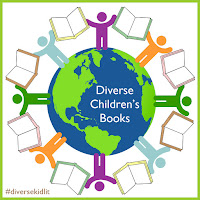Next week, September 25 to October 1 is Banned Books Week. I am extra excited that this year's theme is "Celebrating Diversity." It is shocking to read and reflect on how diverse books take the brunt of censorship challenges and bannings.
The Children's Cooperative Book Center in Madison collects annual statistics about diversity in children's book publishing - both in content and in authorship. If you have never read their annual reports, you should start. You can read the most recent essay on 2015 here. Lee & Low has a great articled based on these statistics: The Diversity Gap in Children's Publishing 2015.
In My Classroom
Now that I am teaching seventh grade, I am looking forward to having a deeper discussion about banned and challenged books. These photos show a part of the banned book display in our classroom library (and our school librarian is putting together another display in the school's library).
Looking through banned book lists [links below], I chose books that would likely be familiar to my students, as well as others that are already a part of our classroom library. Several of the titles are books they have read in previous years. I plan to use this display to facilitate discussions about book choice as well as to encourage students to continue to be assertive and open-minded in their book selections.
What You Can Do
Highlight diverse books and banned books in your classrooms and in your homes. The American Library Association tracks book challenges and has created many different lists of challenged books. You can also visit the Banned Books Week site for more articles and ideas.
- Frequently-challenged books in 2015
- Frequently-banned and challenged "classics"
- Frequently-challenged books with diverse content
Talk with kids and parents about the difference between finding "good fit" books for yourself vs. censoring books for others. Not every book is the right fit for every reader at every time. But that does not mean that that same book isn't the right book for another reader.
Talk about the differences book banning and "soft censorship" (book omission). Kate Messner's latest novel, The Seventh Wish, was subject to many initial complaints from administrators and librarians, and she explains her thoughts in a series of must-read blog posts.
Evaluate your own book collections. Later in the year, I plan to have my seventh grade students inventory our in-class library (and perhaps even sections of our school library), inspired by this post from Crawling Out of the Classroom: Having Students Analyze Our Classroom Library To See How Diverse it is.
Participate in the Reading Without Walls Challenge from Gene Luen Yang, the National Ambassador for Young People’s Literature (and recently-named MacArthur fellow!). The idea is to encourage kids to seek out books that are different from those that they regularly read, whether its about a character that is different or a new topic or a new format. You can read more and download posters here.
How will you celebrate Banned Books Week?
Shared with #DiverseKidLit






Yes - it's important to look beyond outright banning and talk about self censorship and censorship by omissions - great conversations to have with young readers!
ReplyDeleteThanks, Jane! It's been especially interesting to talk about with my middle school students. Many of them have parents concerned about what books they are reading, but many cannot fathom a parent complaining about what another child is reading!
Delete